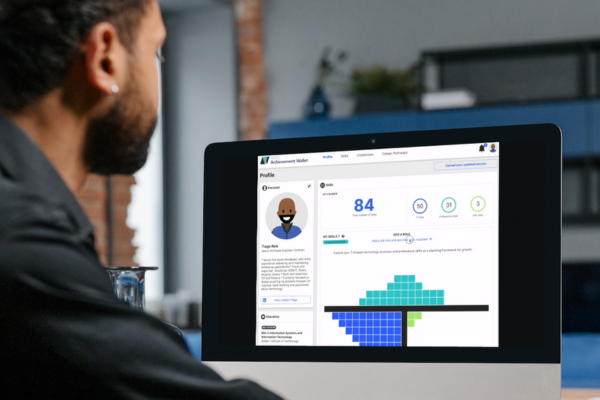LIF Demonstration Site Project Spotlight – WGU

The Learner Information Framework (LIF) is excited to share details about an innovative demonstration site project led by Western Governors University (WGU)!
Valuable information about WGU students’ education and employment experiences exists through many different sources and can be hard to pull together into one comprehensive view. WGU plans to leverage LIF to bring together education and employment information from different sources and enable new connections across digital wallets and broader applications.
Read more about the effort below.
What is Western Governors University Hoping to Accomplish?
WGU aims to achieve several key objectives through its participation in the LIF project:
- Transparency of Skills and Achievements: WGU seeks to make learners’ skills, experiences, and achievements more readily available for use by learners, WGU, and potential employers. This visibility supports personalized learning pathways and provides employers with easy access to a diverse talent pool and students with more potential opportunities.
- Breaking Down Barriers: By leveraging technology and making information about education and employment journeys more visible, WGU aims to eliminate barriers to education and career opportunities, ultimately improving lives.
WGU’s demonstration site focuses on a strategic “Higher Ed-to-Employment” use case. The goal is to implement, test, and evaluate the value of LIF-formatted data in job talent searches. This data encompasses educational and employment experiences over a lifetime that individuals choose to share to advance their careers.
WGU will use LIF tools to standardize various data formats, creating a comprehensive and coherent “story” of an individual’s journey. Currently, it can be difficult to bring key information together into one “picture”. Leveraging normalized data will offer a more transparent, more efficient understanding of a person’s suitability for job opportunities based on their consolidated skills and achievements, previously dispersed across multiple formats and systems.
How is WGU using LIF to make those changes?
WGU will evolve its digital credentialing capabilities, including adopting freshly relevant data standards and advancing WGU’s learners’ digital achievement wallet. This wallet serves as a student-centered repository for issued or self-attested learning and employment skills, experiences, and achievements, which power the wallet’s personalized, skills-based career pathways and employment opportunities.
Partnering with the LIF team, WGU will implement a variety of software components, translate student-specific sets of achievement data, store it locally, and present the data in a viewing application or dashboard, designed around a variety of talent search scenarios that can be used by learners, recruiters, hiring managers, etc. Because the WGU project is about the value of translated data versus the technology that presents it, WGU’s viewing application will likely leverage a common visual analytics platform such as Tableau or Power BI that supports data presentation and visualization with basic search, sort, and filter functionality.
What is the potential impact of this project?
The demonstration site project aims to advance more equitable, skills-based hiring practices by exercising and evaluating LIF-formatted data for talent searches and employment connections. This project also challenges WGU to represent course-completion achievements as verifiable credentials for learners while working on wallet compatibility for student use. Course-completion achievements give learners visibility into skills gained while progressing in a WGU degree program. With over 75% of WGU learners currently employed, course-completion achievements may also provide needed verification of the skills that could lead to career advancement opportunities along their degree journey. WGU is particularly interested in how course-completion achievements will positively impact learners who need to temporarily step away from their studies for personal reasons, allowing them to continue advancing in their careers and return to their education when it is best for them.
What are other potential applications of this approach?
The possibilities for these types of efforts are many. For an institution, this could help create a common practice for sharing data across institutions or across colleges of a large university. This project could help students transfer credits more easily between schools by supporting automated credit recognition systems. Imagine a future where a learner has the power to evaluate their achievements and more quickly ascertain their transfer opportunities across multiple institutions.
What steps will WGU take in this process?
- Intake and Development – WGU will conduct user research, focus groups, surveys, and interviews with students and employers to fully understand their needs and opportunities and develop highly relevant actors, personas, stories, and use cases.
- Test – We will test by sharing achievement data from multiple sources, translating that data using our local LIF software reference implementation. We will then present the translated result in a viewing application, contextualized to evaluate talent search value.
- Feedback – Our team will then solicit employer reaction to the translated LIF data to evaluate its value and effectiveness while noting enhancement opportunities.
Why did WGU join the LIF community?
The Learner Information Framework addresses the inequitable and inconsistent state of learning and employment data that is siloed across our educational and occupational ecosystems, offering innovative and alternative approaches. Two words: mission alignment. Imagine a future where every learner’s journey and opportunities are clearly mapped out, barriers to education and career advancement are eliminated, and where employers have seamless access to the talent they need. This is not just a vision—it is a transformative reality being built today. WGU applauds this focus and embraces the opportunity to address the challenges faced by both job seekers and prospective employers.
Updates on WGU’s journey with LIF will be shared in the coming months. Let us know what specific questions we can answer.